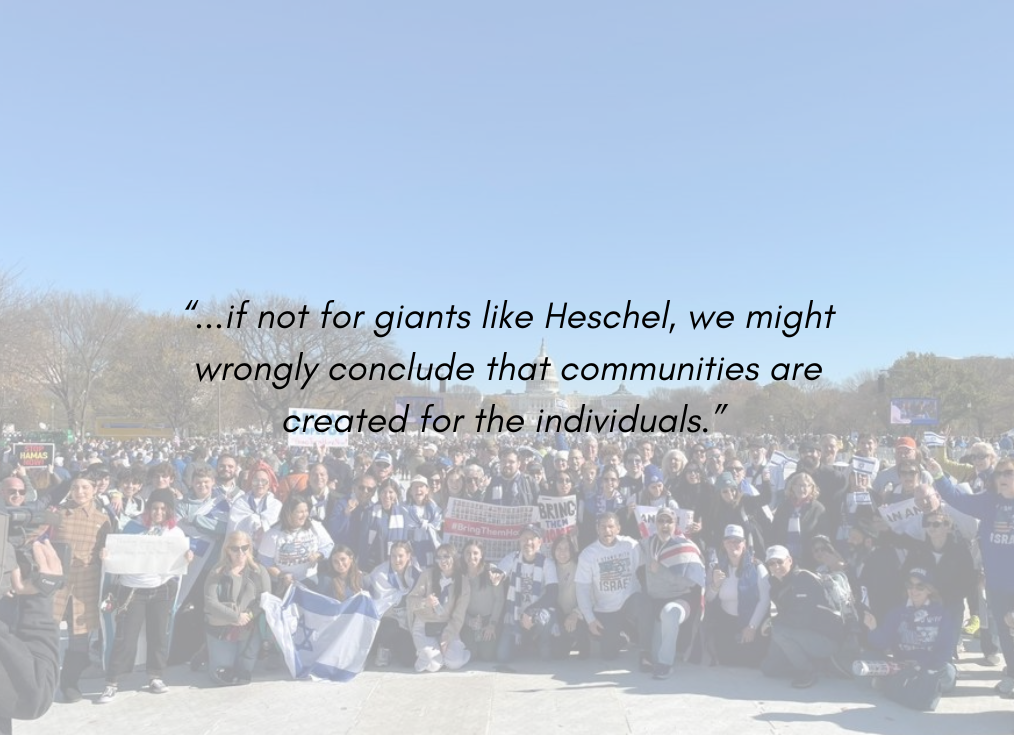The Communities We Inhabit

November 17, 2023 / 4 Kislev 5784
I write this week’s words of Torah still riding the high of having attended the almost 300,000-person March for Israel in Washington DC this week. To say that it will be a day that will stay with me forever does not do it justice.
To be clear, I don’t like crowds. In fact, I don’t like large crowds so much that I think I’m the only person who ever lived in NYC and left NYC on New Year’s Eve. But the March for Israel was different. The March for Israel wasn’t just a crowd. The March for Israel was a community. It was the gathering of 300,000 individuals standing shoulder to shoulder whose hearts beat as one and whose voices cried as one.
When I was in graduate school, I had the opportunity to study the life and writings of the great 20th-century theologian and philosopher, Rabbi Abraham Joshua Heschel. Rabbi Heschel was “a theologian deeply interested in studying the relationship between God and humankind, Heschel believed that when one understands the spark of the divine that exists within each person, he or she cannot harbor hatred for fellow human beings.” Heschel was a prolific scholar who “used his writings to express that social concern was an outlet for religious piety.”(https://kinginstitute.stanford.edu/heschel-abraham-joshua)
Rabbi Heschel emphasized the critical nature of the individual being an active part of a vibrant community. He believed that our strength as individuals is magnified within the context of a compassionate and righteous community, and it is from this perspective that I draw our attention to this week’s Torah portion, Toldot, where the narrative unfolds with the blessings and challenges faced by Jacob and Esau.
…
In Genesis 27:29, Isaac blesses Jacob, saying, “Let peoples serve you.” Rabbi Samson Raphael Hirsch interprets “peoples” not only as nations but also as communities. This communal dimension of the blessing emphasizes the symbiotic relationship between individuals and the communities they inhabit.
Rabbi Heschel’s teachings resonate strongly as he advocated for a deep sense of communal responsibility for ethical conduct. Heschel recognized that the strength of individuals is intimately connected to the health and righteousness of the community. In this interplay, we discover a profound truth: the individual flourishes when immersed in a supportive and just community.
To illustrate this idea, we need not look further than Rabbi Heschel’s own life. During the Civil Rights movement, Heschel stood side by side with the Reverend Martin Luther King Jr., exemplifying his commitment to humanity and the broadest sense of community. Rabbi Heschel’s famous words capture the essence of this commitment: “When I marched in Selma, my feet were praying.”
In participating in the Civil Rights movement, Rabbi Heschel embodied the notion that individuals find their highest purpose when contributing to the well-being of the broader community. His partnership with Dr. King transcended religious and racial boundaries, emphasizing the universal call for justice and the inherent connection between individual moral responsibility and communal harmony.
I have often paraphrased Sir Isaac Newton’s famous “standing on the shoulders of giants” reference, but the truth is that our tradition implores us to be active participants in the communities we inhabit, and if not for giants like Heschel, we might wrongly conclude that communities are created for the individuals. In reality, however, Toldot teaches us that the blessings bestowed upon individuals exist to create the collective blessings of the community. Rabbi Heschel’s life echoes this sentiment, as he tirelessly worked to break down barriers and unite people in the pursuit of justice and equality.
And so, as I stood shoulder to shoulder with the other almost 300,000 individuals in Washington DC this week, I realized that I was living a contemporary testament to the enduring strength of the Jewish community. The March for Israel reflected the progress global Jewry has made in building a 21st-century collective identity. What better public demonstration confirming Rabbi Hirsch and Rabbi Heschel’s teachings on the indispensable nature of community for individual flourishing?
So, this Shabbat, as Jews in America gather in unity, and as we join our local San Antonian family, friends, and neighbors, let us be inspired by the legacy of Rabbi Heschel and the profound lessons of Toldot. Let our communal strength be a beacon of hope, echoing through the ages and illuminating a path toward a more just and compassionate world that will bring our hostages home as safely and speedily as possible. Because we are…
Shabbat shalom.

